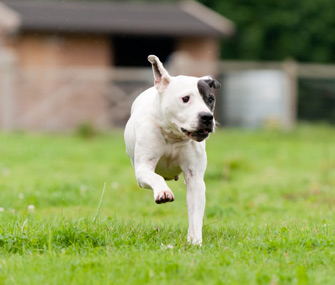Why Does My Dog… Try to Run Away?
Published on November 04, 2013
Skip To

Sharon Crowell-Davis, DVM, DACVB, professor at the College of Veterinary Medicine at the University of Georgia, says your dog is likely telling you something about himself. “When dogs run off, it could mean they’re really not happy at home. It’s not necessarily that they have a bad home life, but as a species, the majority of dogs are curious and want to be active and explore and discover,” she explains. “If you only take them out to potty and for a 10-minute walk, dogs may run off simply to seek activity and stimulation.”
Not All Dogs Run
Of course, not every dog is a runner. Some dogs within the same household can have very different reactions to an opportunity to run free. Dr. Crowell-Davis attributes this to a number of things, including variations in temperament. In the same way some people are homebodies, some dogs prefer the familiarity and comfort of home. Certain breeds also find their physique a barrier to becoming escape artists. Bulldogs, for instance, are unable to run fast and are not going to have much of an opportunity to take off, Dr. Crowell-Davis says. “But more likely it depends on early experience and how the dog is raised,” she adds. “Good socialization in puppies produces a puppy that is comfortable with the world and comfortable going out and exploring it.” Conversely, puppies living in a barren environment could become timid because of a lack of exposure to the world.Spice It Up at Home
So how can you keep the normal adventure-seeking qualities in your pup from getting him into trouble? One way is to provide an appropriately fun home environment, Dr. Crowell-Davis suggests. Good long walks provide mental as well as physical exercise, and stimulating toys like puzzle food toys are going to improve your dog’s quality of life and, therefore, make him more interested in staying at home.In addition to making home more attractive, Dr. Crowell-Davis stresses the importance of teaching your dog proper recalls. Getting your dog to come when called rather than running off is part of puppy socialization training, and even older dogs can learn to come when called, but it takes practice.
Getting Your Dog Recall Ready
“You should give your dog a really good reason to come to you,” Dr. Crowell-Davis says. And make sure every time he comes when called he gets a delicious treat and lots of praise, even if he doesn’t respond immediately. “One common mistake dog owners make is getting angry if they call their dog and the dog doesn’t come immediately," she says. "When the dog finally comes to them or they catch the dog, they proceed to punish him.” Even verbally reprimanding the dog teaches the dog that if you come or allow yourself to get caught, bad things will happen. “So the next time the owner calls the dog, the dog is less likely to come, and it can become a vicious cycle," she explains. "But even one incident when you punish your dog for not being good on recalls — that’s going to make the situation even worse.”Dr. Crowell-Davis knows firsthand the effects of good recall training. She adopted a rescue who got out of the house off-leash and ran off, ignoring Dr. Crowell-Davis’ calls. When she finally cornered the pup, who was crouched down to the ground with her ears pinned back and her tail tucked, Dr. Crowell-Davis “could tell she was expecting some sort of physical punishment.” Instead, Dr. Crowell-Davis praised the dog, hugged and petted her, and told her she was “a great dog for getting caught.” She then took her pup home and gave her some of her favorite food. “That was the start of her learning that ‘Hey, with this family, when you come back you get hugs and petting and really good food,’” Dr. Crowell-Davis says. “And that is the lesson to teach your dogs to get them to come back.”
You may also want to watch the Vetstreet video: Teach Your Dog to Come When Called
More on Vetstreet.com:





